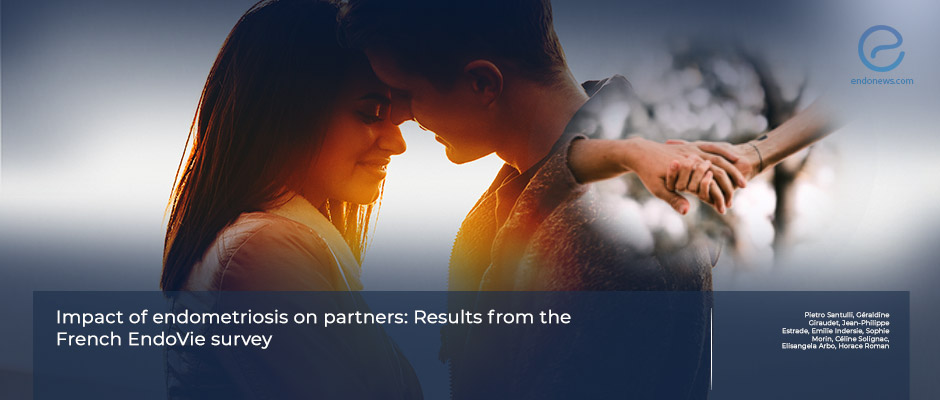Exploring the Impact of Endometriosis on Partners
Dec 18, 2024
Survey study shows how endometriosis effects partners’ emotional well-being and relationships
Key Points
Highlight
- Endometriosis impacts not only women but also their partners, affecting their well-being and relationships.
- Partners' prior knowledge of endometriosis does not lessen the emotional and relational burden.
Importance
- Raising awareness about the need for better support and communication between healthcare providers, patients, and their partners is crucial in the management of endometriosis.
What's done here
- A national survey in France (as part of the EndoVie study) was conducted with 100 participants in relationships with women diagnosed with endometriosis.
- The survey explored the impact of endometriosis on partners' lives, their knowledge of the condition, and the effects on relationships.
Key results
- 61% of partners had no prior knowledge of endometriosis.
- Emotional strain was significant, with 26% of partners not understanding their partner’s pain and 19% feeling guilty.
- Informed partners (39% of participants) reported higher impact scores on relationships, leisure, and psychological well-being compared to uninformed partners (61%).
- 83% were comfortable discussing endometriosis, but only 64% addressed it rarely.
- 70% of participants advocated for expert centers, and 63% wanted more information from gynecologists.
Strengths and limitations
- The strengths include providing valuable insights into the impact of endometriosis on intimate aspects of relationships, which are rarely explored in existing literature.
- The limitations are the study's descriptive nature, selection bias, and lack of detailed data on the stage of endometriosis, treatments, and current symptoms.
Lay Summary
Endometriosis has a significant impact on women, especially in terms of their sexual and relational lives. However, there is limited research on how endometriosis affects the partners of women living with this condition. Santulli et al. from France aimed to further develop the understanding of the experiences and perceptions of the partners of women with endometriosis by assessing how the condition impacts their well-being and daily lives. The article was published in the December 2024 issue of the European Journal of Obstetrics & Gynecology and Reproductive Biology.
A national web-based survey was conducted in January 2020 by Ipsos in France as part of a larger study called EndoVie, targeting individuals in relationships with women diagnosed with endometriosis. Participants answered a 21-point questionnaire on their sociodemographic background, knowledge of endometriosis, and its impact on their relationships and daily life. The study analyzed how prior knowledge of the condition influenced partners' experiences.
The survey included 100 participants (92 men and eight women), with the majority over 45 years old and in relationships lasting over 13 years. Before their partner's diagnosis, 22% had a clear understanding of endometriosis, 17% had heard of it, and 61% had no knowledge. The authors discuss that, in line with previous observations, the partners of women with endometriosis expressed both sympathy and empathy toward them.
The most recognized symptoms were painful periods (46%), abnormal bleeding (34%), and pelvic pain (32%). Partners rated the impact of endometriosis on sexual relations (4.2/10) and the couple’s life (3.6/10), while the psychological impact, leisure, and relationships with friends and family were rated lower. Despite the emotional toll, the study found that 26% of partners felt they didn’t fully understand their partner’s expectations during pain episodes, while 19% felt guilty for blaming their partner for the challenges faced. Additionally, 40% of participants initially expressed concern about the diagnosis, and 17% reported negative emotions like frustration and embarrassment. Informed partners, who had prior knowledge of the condition, reported higher levels of impact compared to uninformed partners, especially in terms of emotional strain and relationship challenges. It was emphasized that informed partners were more likely to share the burden, feel guilty about blaming their partner, and report a greater impact on the relationship. Despite these difficulties, most participants felt comfortable discussing endometriosis, though discussions were infrequent. Many expressed a desire for more information and specialized support from healthcare providers.
The authors conclude by saying that improving awareness and offering better support for both patients and their partners is key to managing the impact of endometriosis on their lives and relationships.
Research Source: https://pubmed.ncbi.nlm.nih.gov/39515129/
endometriosis well-being partners

